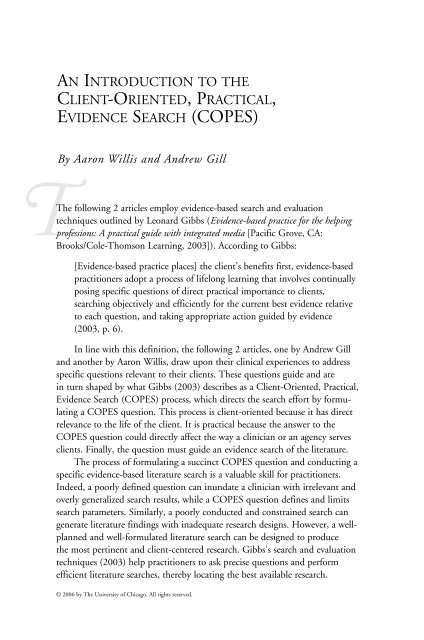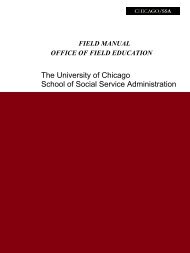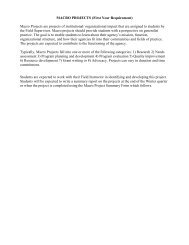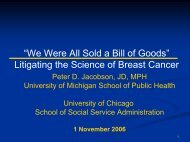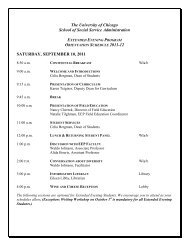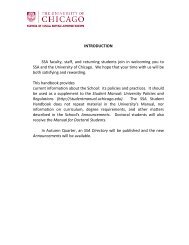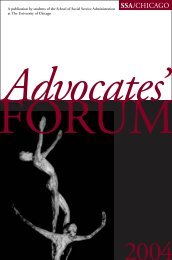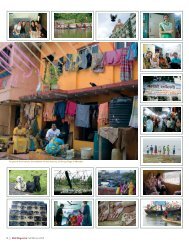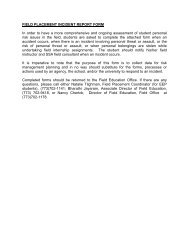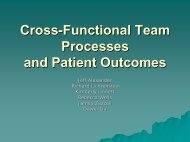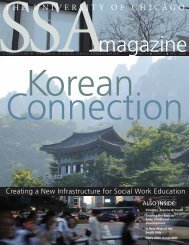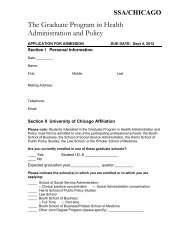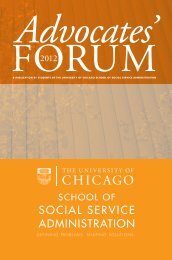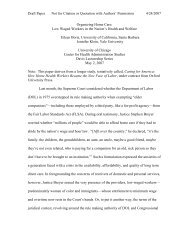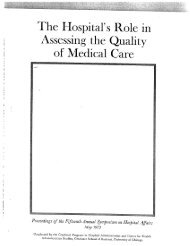2006 - School of Social Service Administration - University of Chicago
2006 - School of Social Service Administration - University of Chicago
2006 - School of Social Service Administration - University of Chicago
You also want an ePaper? Increase the reach of your titles
YUMPU automatically turns print PDFs into web optimized ePapers that Google loves.
AN INTRODUCTION TO THE<br />
CLIENT-ORIENTED, PRACTICAL,<br />
EVIDENCE SEARCH (COPES)<br />
By Aaron Willis and Andrew Gill<br />
The following 2 articles employ evidence-based search and evaluation<br />
techniques outlined by Leonard Gibbs (Evidence-based practice for the helping<br />
pr<strong>of</strong>essions: A practical guide with integrated media [Pacific Grove, CA:<br />
Brooks/Cole-Thomson Learning, 2003]). According to Gibbs:<br />
[Evidence-based practice places] the client’s benefits first, evidence-based<br />
practitioners adopt a process <strong>of</strong> lifelong learning that involves continually<br />
posing specific questions <strong>of</strong> direct practical importance to clients,<br />
searching objectively and efficiently for the current best evidence relative<br />
to each question, and taking appropriate action guided by evidence<br />
(2003, p. 6).<br />
In line with this definition, the following 2 articles, one by Andrew Gill<br />
and another by Aaron Willis, draw upon their clinical experiences to address<br />
specific questions relevant to their clients. These questions guide and are<br />
in turn shaped by what Gibbs (2003) describes as a Client-Oriented, Practical,<br />
Evidence Search (COPES) process, which directs the search effort by formulating<br />
a COPES question. This process is client-oriented because it has direct<br />
relevance to the life <strong>of</strong> the client. It is practical because the answer to the<br />
COPES question could directly affect the way a clinician or an agency serves<br />
clients. Finally, the question must guide an evidence search <strong>of</strong> the literature.<br />
The process <strong>of</strong> formulating a succinct COPES question and conducting a<br />
specific evidence-based literature search is a valuable skill for practitioners.<br />
Indeed, a poorly defined question can inundate a clinician with irrelevant and<br />
overly generalized search results, while a COPES question defines and limits<br />
search parameters. Similarly, a poorly conducted and constrained search can<br />
generate literature findings with inadequate research designs. However, a wellplanned<br />
and well-formulated literature search can be designed to produce<br />
the most pertinent and client-centered research. Gibbs’s search and evaluation<br />
techniques (2003) help practitioners to ask precise questions and perform<br />
efficient literature searches, thereby locating the best available research.<br />
© <strong>2006</strong> by The <strong>University</strong> <strong>of</strong> <strong>Chicago</strong>. All rights reserved.


